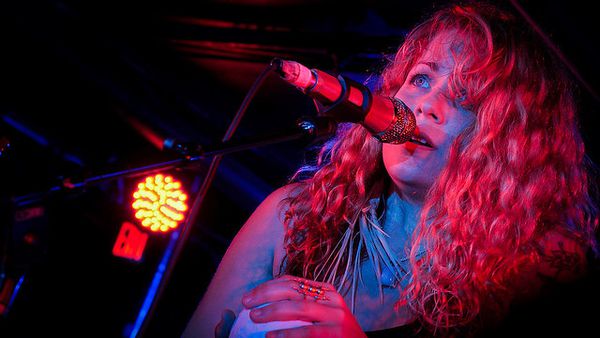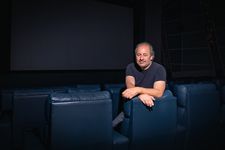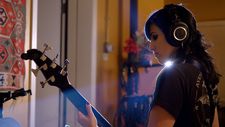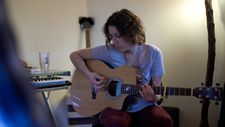 |
| Beautiful Was The Fight |
A love letter to the Boston music scene and the female and non-binary artists who have helped to create its distinctive sound, Beautiful Was The Fight is a documentary which goes behind the scenes to tell their stories as well as giving viewers a chance to see what they can do on stage. It helps to put the city on the map and establish its musical voice. Director Dave Habeeb agreed to answer some questions about how it came to be and what he hopes to achieve with it.
Jennie Kermode: How did you first fall in love with the Boston music scene?
Dave Habeeb: When I was in high school and college, I did attend a lot of concerts at some of our smaller and mid-sized local venues, such as The Paradise and The Orpheum, and our large stadium venues, such as the former Boston Garden or The Worcester Centrum, but I only went to see really established, popular international acts. Prior to starting this film project seven years ago (2016) the local scene wasn’t familiar to me. In 2016, I went to a local venue in Harvard Square called The Sinclair to see a friend’s band, Walter Sickert and the Army of Broken Toys. I brought my camera and enjoyed the show from the front row, center stage. It was the first time I had been at a show like this. One of our local artists, pressed up against the stage in a crush of people, and taking photos. I hadn’t heard of the opening act, Ruby Rose Fox, but was instantly hooked when she and her band took the stage.
 |
| Dave Habeeb |
I took many photos of each band that night and on my way out stopped by the merch tables to buy CDs and t-shirts from each band. I spent the next few nights editing my photos and listening to Ruby’s CD non-stop. A couple of weeks later I reached out to her to see if she would be interested in making a short music documentary with me. After catching a couple more shows, mostly to film b-roll footage for the project, I realised I had been missing out not only on so many talented up and coming artists, but cool venues and a music community I didn’t know at all, but now feel completely connected to. From that point on, I mostly see shows featuring local acts and rarely attend the big stadium concerts anymore. The experience is very different.
JK: Were there any musicians you regretted not having room for in the film, or any you wanted to include but couldn't get?
DH: Not really. The list came together very organically, and there are over 30 musicians featured in the film. I did try my best to touch upon as many genres as possible and I do feel that there is a pretty good amount of genre representation in the film. I did have some people ask if I was going to include Boston artists who reached a certain level of success, such as Aimee Mann, Susan Tedeschi, or Kim Deal (The Pixies), for example, but that was never the plan. I wanted to focus specifically on female artists who were still in the Boston music scene and developing their careers.
JK: What kind of reception did you get when inviting people to participate? Did they instantly share your feelings about the importance of the film?
DH: I remember it being very positive overall from everyone who I approached. I would usually approach different artists in-person after seeing them perform at a show, let them know that I liked what they were doing, that was the only real pre-requisite for me, I had to personally like their vibe and music, and told them the general idea of the film. I do believe each artist did feel a connection to the project in their own personal way. I approached over 30 people and, I’m happy to say, no one said no. I did feel good about that because I wasn’t an established filmmaker, they had no real film resume to look back on that might make them want to be a part of this film, and I was sort of a stranger to the local music scene as well. Building trust right from the start is important and something I pride myself on.
JK: There's a wider political context lurking in the background of the film. How did you decide how much of that to include, and how to weave it in?
DH: The project, for me, is always about music first, the local scene, and a celebration, hopefully, of what each of these artists are trying to accomplish and have accomplished. Gender inequality has always been really troubling and confusing to me. I just don’t understand it, so I did want to address some of those issues head on and make it an important theme in the film, but also not completely dwell on it. As far as a wider political context, some of that, without being too specific, was motivated by the time in which the film was being made. Politics, protests, and debates, all related things were on my mind, so I did ask some specific questions to each artist in that category, and they had a lot to share, but I also felt really compelled on a personal level, separate from an opportunity to get b-roll for the film, to attend the Women’s March in Washington, D.C. Without getting into it, I went just because it felt like the right thing to do and would have whether I was making this film or not.
 |
| Beautiful Was The Fight |
JK: Women and LGBTQ+ people have traditionally been sidelined in music, as many of your interviewees point out, but now that that's changing, how do you think the scene is changing as result?
DH: I do believe it is changing, and I’m glad about that, but just when you think things are better you hear something or see something that simply reminds us that, perhaps, there is still room for more change. I don’t ever want to make the mistake that I know what is ok and what isn’t, especially as I don’t walk in the shoes of these women, or anyone who is a bit different from me, and can’t really know their experiences, only my own. My goal is just to pay more attention, try to understand, and help share some of these topics with people, through the film, in hopes of continued discussion, learning, and change. Bottom line, however, yes a lot of change has happened and that is a great thing, but it took the efforts of many, many women, and men, from the past to get us here.
JK: Some of the participants talk about their frustration with people trying to tell them how they should look, but how did you approach photographing them in order to avoid falling into a problematic style by accident, just because it's familiar?
DH: I had a couple people ask me about that. I understand it is a problem, I guess it’s called “the male gaze” in photography or filmmaking? I can only say that I tried my best to capture everyone who appeared in the film, men and women, in a flattering (cinematic) way that looked professional and, hopefully, somewhat artistic. I was more concerned with getting to know each person through long, detailed interviews (conversations really) and my only goal aesthetically was to create a good-looking film. I was never thinking of trying to make anyone look a certain way, sexy or appealing or something like that, just tried my best to capture their look, meaning as artists, and their vibe. I did all of the interviews myself, meaning lighting, sound, camera, and talking with each artist, which was tricky, but I did want to create a less distracting environment so they could open up and be comfortable.
As far as b-roll footage, I just like to get in close to the action, whatever it is, to hopefully bring the audience front row and backstage in an engaging way. Whatever was happening in front of my I did my best to capture. Unlike the one story in the film that is shared, I would never ask anyone to pose or wear a certain outfit, for so many reasons, but especially because I don’t like documentaries that are phony. Tried hard to keep everything as authentic as possible, which is another theme in the film.
JK: What did you learn in the course of making the film?
DH: It’s hard, and can take a lot longer than I thought, but sticking with it, and taking the time you need to get it right, is the way to go. I foolishly thought I would film for a few months and have the film edited in six months. It took seven years, but I’m glad it did. It needed time to find itself and I’m a different person now than when I started it. While I did learn some things about the process along with the way, how film festivals work, marketing, legal aspects, planning screenings, etc., I think things I learned most had nothing to do with filmmaking but rather about people, the local music community, and people’s passions. If I didn’t make this film, I wouldn’t have had all these experiences with so many people who opened up their lives to me. I also have come to learn how important it is to have local venues, to support local artists and show up for this community.
JK: Despite its Boston focus, do you think that there are elements of the film that people will connect with and recognise in their own local scenes?
 |
| Beautiful Was The Fight |
DH: Yes, absolutely. I think first and foremost, the gender and identity topics and how one defines success themes are universal and not limited to this industry, of course. I truly hope that people find that information in the film comforting and inspiring. As far as music scenes, I do believe that the Boston story is not unique. There are so many hard working, talented musicians out there in their own music scenes, but I think the struggle is also very relatable. By highlighting some of the challenges, but also exploring ways around them and the strength and support of a community that gets behind itself, I’m hopeful that some of the messages in this film will hit home with music communities in many cities in the US and hopefully elsewhere.
JK: What's next for you as a filmmaker?
DH: I plan on taking a bit of a break for now. I have hours and hours and hours of home video footage and thousands of photos of my kids, they are older now, that I would like to organise and archive for them. That’s my next project really. Beyond that, I would like to work on a short film, but a narrative next time instead of a documentary. I don’t have a specific idea or script yet, but I would like to spend more time working with actors and creating something completely fictional.
Beautiful Was The Fight has been touring festivals in the US. It won the 2023 Telly Silver Award for Cinematography, Editing, and Documentary Feature (Long Form) and was an Official Selection at IFFBoston 2023.





















